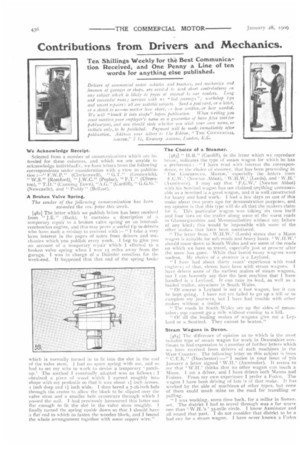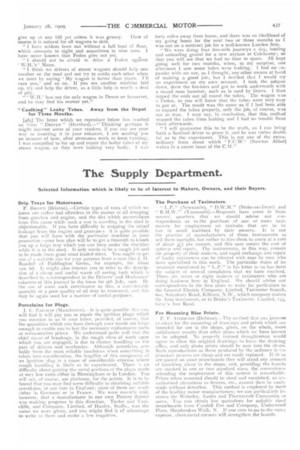Contributions from Drivers and Mechanics.
Page 18

Page 19

If you've noticed an error in this article please click here to report it so we can fix it.
Ten Shillings Weekly for the Best Communication Received, and One Penny a Line of ten words for anything else published.
Drivers of commercial motor vehicles and tractors, and mechanics and foremen of garazes or shops, are invittil to send short contributions un
any subject wh:ch is likely to prove of interest to our readers. Lung and successful runs ; services with ;I) "lost journey's" ; workshop tips and smart repairs: all are suitable subjects. Send a post card, or a letter, or a sketch to us—no inath:r how short, r r how written, or how worded.
We will "knock it into shape" before publication. Il'hes writing you must mention your employer's name as a kuarantee of bona fries Mot for publication), and you should state whether you wish your own name, or initials only, to be published. Payment will be made immediately after publ:cation. Address your letters to 1 he Editor, " TH E Cowls:sew. snoros."FJ, Rosebery Avenue, !widen, E.G.
We Acknowledge Receipt.
Selected from a number of communications which are intended for these columns, and which we are unable to acknowledge individually, we have letters from the following correspondents under consideration with a view to publica
tion :—" E. W. P.'' (Clerken " G.T." (G reenwich), " W.S." (Romford), " J.W.C." (Poplar), " F.T." (Ulverston), " T.D." (Canning 'Dawn), "A.G." (Cardiff), " G.G.G." (Newcastle), and " Paddy " (Belfast).
A Broken Valve Spring.
The sender of the following communication has been awarded the los, prize this week.
[482] The letter which we publish below has been received from " J.E." (Bath). It contains a description of a temporary repair to a broken valve spring on an internalcombustion engine, and this may prove a useful tip to drivers who have such a mishap to contend with :--" I take a very keen interest in the pages of notes from drivers and mechanics which you publish every week. I beg to give you an account of a temporary repair which I effected to a broken valve spring when I was 15 miles away from the garage. I was in charge of a Daimler omnibus for the week-end. It happened that that end of the spring broke
which is normally turned in to fit into the slot in the end of the valve stem. I had no spare spring with me, and so had to set my wits to work to devise a temporary patchup.' The method I eventually adopted was as follows : I obtained a piece of wood which I carved roughly into shape with my penknife so that it was about I: inch across, inch deep and T inch wide. I then bored a 7-16-inch hole through the centre to allow the block to be slipped over the valve stem and a smaller hole crossways through which I passed the nail. T had previously hammered this latter out flat enough to fit the slot in the valve stem roughly. T finally turned the spring upside down so that I should have a flat end to which to fasten the wooden block, and I bound the whole arrangement together with some copper wire." The Choice of a Steamer.
H.B." (Cardiff), in the letter which we reproduce belOW, indicates the type of steam wagon for which he has a preference :--" I have read with interest the correspondence, to the choice of steamer, that has been proceeding in • IIIE COMMERCIAL MOTOR, especially the letters from (Newton Abbot), ' 1V.H.W.' (Leeds), and W.-I.' (Axminster). I In:1y say that F.C.W.' (Newton Abbot) with his Sentinel wagon has nor claimed anything unreasonable as a Sentinel is a good wagon, and it is well constructed for heavy and hard work. I had a few days on one of this make about two )ears ago for demonstration purposes, and my opinion is that this type will do all that the makers claim for it. This particular wagon was taking six tons itself and four tons 011 the trailer along some of the worst roads in Glamorganshire and Monmouthshire without any failure of any kind; this would be impossible with some of the other makes that have been mentioned.
" The letter from W.H.W.' (Leeds) states that a Mann wagon is suitable for soft roads and heavy loads. W.H.W.' should come down to South Wales and see some of the roads on which we have to travel, especially just at present after the snow has gone. While that lasted many wagons were useless. My 'choice of a steamer is a Leyland.
" I have had about thirty years' experience with road engines; of that, eleven have been with steam wagons. I have driven some of the earliest makes of steam wagons, but I can honestly say that the best machine that I have handled is a Leyland. It can take its load, as well as a loaded trailer, anywhere in South Wales.
" Of course a Leyland is not a fast wagon, but it can be kept going. I have not yet failed to go up a hill or to convlete my journeys, but I have had trouble with other makes without a trailer.
" The roads in South Wales are up the sides of mountains: you cannot go a mile without coming to a hill. " Of all the leading makes of wagons give me a Leyland or a Sentinel. They cannot be beaten."
Steam Wagons in Devon.
14841 The difference of opinion as to which is the most suitable type of steam wagon for work in Devonshire continues to find expression in a number of further letters which we have received from drivers of such machines in the West Country. The following letter on this subject is from " C.E.K." (Dorchester) :—" I notice in your issue of 7th January a letter signed 'W.II.' (Axminster). It seems to me that ' WM.' thinks that no other wagon can touch a Mann. I am a driver, and I have driven both Matins and Fodens. From my own experience I prefer a Foden. The wagon I have been driving of late is of that make. It has worked by the side of machines of other types, but none of them could touch mine on the road for travelling or p gWas working, some time back, for a miller in Somerseuli;i:rThe district I had to travel through was a far worse one than W.H.'s ' 35-mile circle. I know Axminster and all round that part. I do not consider that district to be a bad one for a steam wagon. I have never known a Foden
give up at any hill yet unless it was greasy. Then of course it is natural for all wagons to skid.
" I have seldom been out without a full load of flour, which ;Amounts to eight and sometimes to nine tons. I have never known that Foden give out yet.
" I should not be afraid to drive a Foden against W.H.'s ' Mann.
"1 think we drivers of steam wagons should help one another on the road and not try to outdo each other when we meet by saying My wagon is better than yours. Ill race you,' and so on. If you see another machine laid up, try and help the driver, as a little help is worth a deal of pity.
" W.H.' has not the only wagon in Devon or Somerset, and he may find his master yet."
"Caulking" Leaky Tubes. Away from the Depot for Three Months.
[485] The letter which we reproduce below has reached us from " DRIVER " (Hertford).—" Thinking perhaps it might interest some of your readers, if you can see your way to inserting it in your columns, I am sending you an account of how, after strenuous work to keep running, I was compelled to lay up and repair the boiler tubes of my steam wagon, as they were leaking very badly. I was
forty miles away from home, and there was no likelihood of my going home for the next two or three months as I was out on a contract job for a well-known London firm.
We were doing four five-mile journeys a day, loading and unloading gravel for a new asylum at Colchester; so that you will see that we had no time to spare. All kept going well for two months, when, to my surprise, one afternoon I saw some tubes were leaking. I had no expander with we nor, as I thought, any other means at hand of making a good job; but I decided that I would try an experiment on my own account. I took the ashpan down, drew the fire-bars and got to work underneath with a round nose hammer, such as is used by litters. I then tapped the ends out all round the tubes. The wagon was a Foden, so you will know that the tubes were very easy to get at. The result was the same as if I had been able to expand the -tubes properly, only the job, of course, was not so true. I may say, in conclusion, that this method stopped the tubes from leaking and I had no trouble from them afterwards.
" I will guarantee this to be the truth, as I can bring forth a Sentinel driver to prove it, and he was rather doubtful as to the experiment. This is not one of the extraordinary feats about which F.C.W.' (Newton Abbot) writes in a recent issue of the C.111:'




















